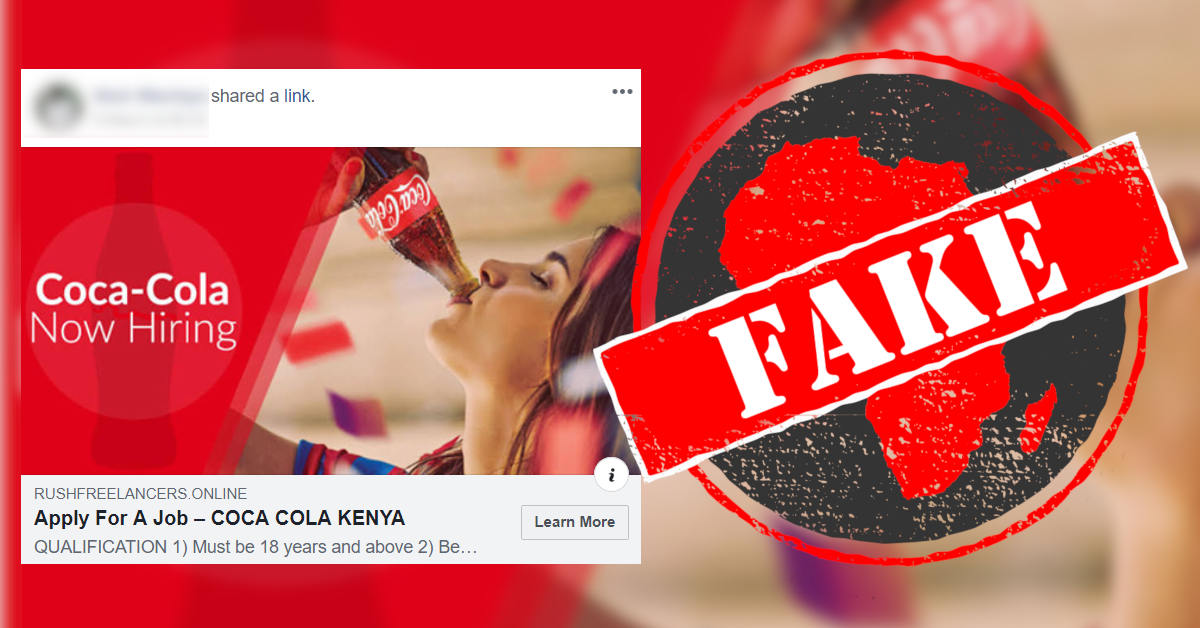An advert posted on a Facebook page claims that Coca-Cola in Kenya is recruiting.
The post is in the same format as previous fake job ads debunked by Africa Check. These have targeted different companies, claiming that the positions are thanks to the Covid-19 situation in the country.
This post says the available Coca-Cola jobs include drivers, machine operators, receptionists, accountants and “tea girls”. Applicants are promised a daily wage of KSh850.
The post asks applicants to contact the page privately via direct message. This is an unusual way of hiring and is the first red flag that the ad may be false.
We took a closer look.

Another red flag is how frequently the Facebook page’s details have been changed.
It was created on 24 July 2020 and first called “Free gas cylinders from total gas”, according to Facebook's page transparency feature. At the time it was advertising free gas cylinders but Africa Check found that these offers were all fake.
On 20 August the name of the page was changed to “Cocacola company job opportunity around Kenya”. It is unlikely that any legitimate advertiser of real jobs would do this and is a clear indication of fraud.
There are no similar ads on Coca-Cola Kenya’s official social media platforms. The suspicious page has no links to Coca-Cola Kenya. The ad is fake.
Coca-Cola has warned the public several times about recruitment scams. Read our detailed guide on how to identify job scams for further useful information. – Dancan Bwire
The post is in the same format as previous fake job ads debunked by Africa Check. These have targeted different companies, claiming that the positions are thanks to the Covid-19 situation in the country.
This post says the available Coca-Cola jobs include drivers, machine operators, receptionists, accountants and “tea girls”. Applicants are promised a daily wage of KSh850.
The post asks applicants to contact the page privately via direct message. This is an unusual way of hiring and is the first red flag that the ad may be false.
We took a closer look.

Page previously advertised scam giveaway
Another red flag is how frequently the Facebook page’s details have been changed.
It was created on 24 July 2020 and first called “Free gas cylinders from total gas”, according to Facebook's page transparency feature. At the time it was advertising free gas cylinders but Africa Check found that these offers were all fake.
On 20 August the name of the page was changed to “Cocacola company job opportunity around Kenya”. It is unlikely that any legitimate advertiser of real jobs would do this and is a clear indication of fraud.
There are no similar ads on Coca-Cola Kenya’s official social media platforms. The suspicious page has no links to Coca-Cola Kenya. The ad is fake.
Coca-Cola has warned the public several times about recruitment scams. Read our detailed guide on how to identify job scams for further useful information. – Dancan Bwire
Republish our content for free
For publishers: what to do if your post is rated false
A fact-checker has rated your Facebook or Instagram post as “false”, “altered”, “partly false” or “missing context”. This could have serious consequences. What do you do?
Click on our guide for the steps you should follow.
Publishers guideAfrica Check teams up with Facebook
Africa Check is a partner in Meta's third-party fact-checking programme to help stop the spread of false information on social media.
The content we rate as “false” will be downgraded on Facebook and Instagram. This means fewer people will see it.
You can also help identify false information on Facebook. This guide explains how.


Add new comment